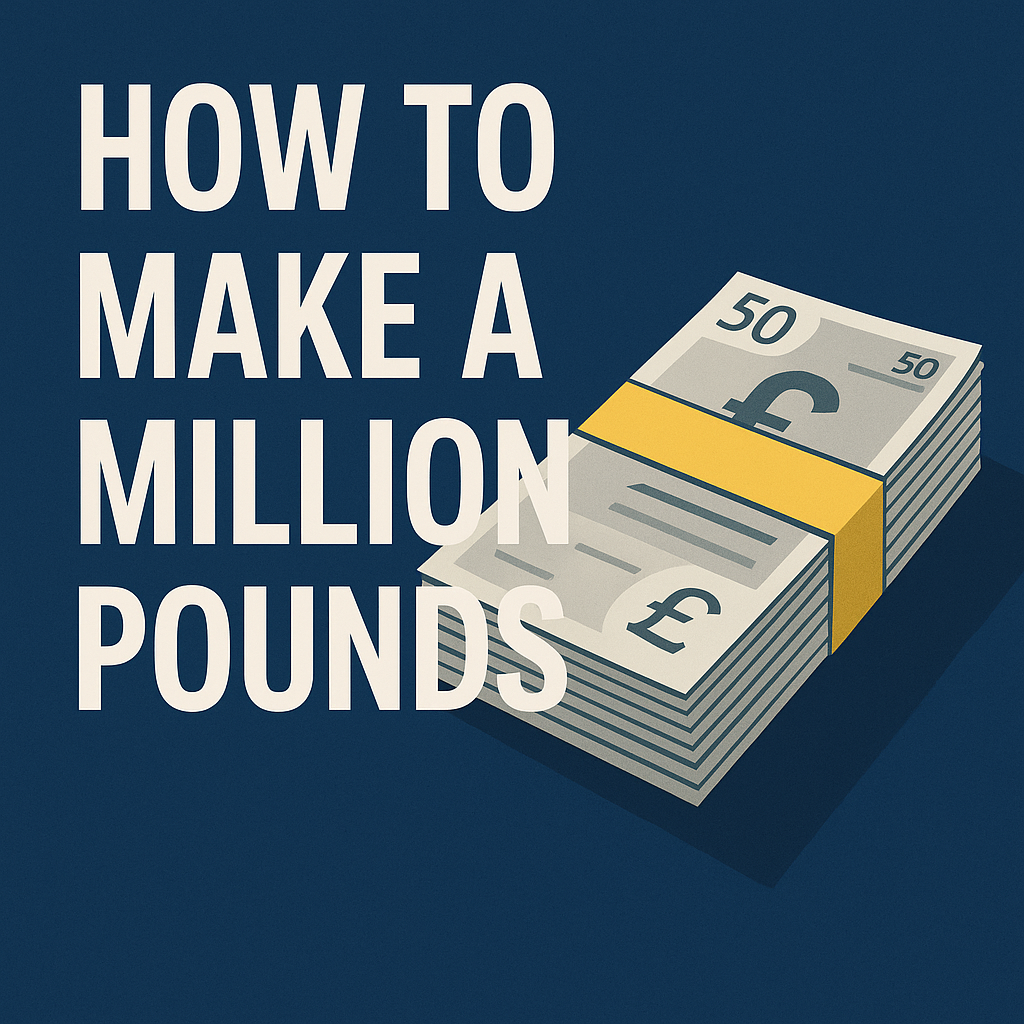How Can I Make a Million Pounds? | A Step-by-Step Guide (2026)
Making a million pounds isn’t reserved for the lucky few — it’s about strategy, discipline, and time. Here’s our 2026 guide to realistic wealth-building in the UK.

- expertise:
- CFD Trading, Forex, Derivatives, Risk Management
- credentials:
- Chartered ACII (2018) · Trading since 2012
- tested:
- 40+ forex & CFD platforms with live accounts

- expertise:
- Platform Testing, Cryptocurrency, Retail Investing
- credentials:
- Active investor since 2013 · 11+ years experience
- tested:
- 50+ platforms · 200+ guides authored
How We Test
Real accounts. Real money. Real trades. No demo accounts or press releases.
What we measure:
- Spreads vs advertised rates
- Execution speed and slippage
- Hidden fees (overnight, withdrawal, conversion)
- Actual withdrawal times
Scoring:
Fees (25%) · Platform (20%) · Assets (15%) · Mobile (15%) · Tools (10%) · Support (10%) · Regulation (5%)
Regulatory checks:
FCA Register verification · FSCS protection
Testing team:
Adam Woodhead (investing since 2013), Thomas Drury (Chartered ACII, 2018), Dom Farnell (investing since 2013) — 50+ platforms with funded accounts
Quarterly reviews · Corrections: info@theinvestorscentre.co.uk
Disclaimer
Not financial advice. Educational content only. We're not FCA authorised. Consult a qualified advisor before investing.
Capital at risk. Investments can fall. Past performance doesn't guarantee future results.
CFD warning. 67-84% of retail accounts lose money trading CFDs. High risk due to leverage.
Contact: info@theinvestorscentre.co.uk
Quick Answer: To Make a Million Pounds, You'll Need To:
To make a million pounds, you'll need to build valuable skills, focus on solving profitable problems, create or invest in scalable opportunities, manage money wisely, stay disciplined over time, and consistently reinvest your earnings to accelerate growth toward long-term financial success, and stability.

What Are the Key Factors to Making a Million Pounds?
Key factors to making a million pounds include building high-value skills, creating or investing in scalable income streams, solving profitable problems, maintaining strong financial discipline, managing risk wisely, leveraging compounding through reinvestment, staying consistent over time, and adapting quickly to new opportunities as markets change.
How Much Should I Save Each Month?
The amount you save each month is the cornerstone of your journey to a million pounds. It can feel overwhelming, but start by assessing your current finances. Are you saving enough? I always recommend a minimum of 10-20% of your monthly income going directly into savings or investments. If you can push it higher, even better. Every pound you save is a step closer to your goal.
If your income is limited, consider ways to boost your earnings, whether it's through a side hustle, career advancement, or cutting unnecessary expenses. Every bit counts, and the earlier you start, the more compound interest can work in your favour.
What Investment Options Offer the Best Returns?
Once you've nailed down your savings, investing those funds is the next critical step. Cash sitting in a savings account won't get you to a million. Historically, equities (stocks and shares) have provided some of the best returns over the long term, often averaging 8-10% annually.
For example, I personally like to invest in a mix of index funds and ETFs, which spread risk across different companies and sectors. Diversification is key here; don't put all your eggs in one basket. Bonds, property, and even small-cap stocks can also be part of your portfolio, but it's essential to match your investments with your risk tolerance.
Remember, the higher the potential return, the higher the risk. Balancing risk and return is crucial—don't be afraid to seek professional financial advice to tailor your investment strategy.
How Long Will It Take to Reach a Million?
Time is one of your greatest allies when it comes to wealth-building. The sooner you start saving and investing, the longer your money has to compound. But how long will it actually take?
This depends on a combination of how much you can save each month and the returns on your investments. For instance, if you save £1,000 a month and your investments grow at 8% annually, it could take around 25 years to hit the million-pound mark. That might sound like a long time, but the key is consistency. If you can increase your savings or achieve higher returns, you'll reach your goal even sooner.
In my experience, patience and discipline are everything. I've found that setting smaller, achievable goals along the way helps keep me motivated. Celebrate the milestones, whether it's reaching £50,000 or £100,000, and remember that every bit of progress gets you closer to your million-pound dream.
Compound Interest Table (£450/month at ~8% annual return, £5,000 initial deposit)
| Year | Deposits | Interest | Total Deposits Accrued | Interest Balance |
|---|---|---|---|---|
| 0 | £5,000.00 | - | - | £5,000.00 |
| 1 | £5,400.00 | £778.07 | £10,400.00 | £11,178.07 |
| 2 | £5,400.00 | £1,425.00 | £15,800.00 | £18,003.07 |
| 3 | £5,400.00 | £2,139.66 | £21,200.00 | £25,542.73 |
| 4 | £5,400.00 | £2,929.16 | £26,600.00 | £33,871.89 |
| 5 | £5,400.00 | £3,801.34 | £32,000.00 | £43,073.23 |
| 6 | £5,400.00 | £4,764.84 | £37,400.00 | £53,238.06 |
| 7 | £5,400.00 | £5,829.23 | £42,800.00 | £64,467.29 |
| 8 | £5,400.00 | £7,005.07 | £48,200.00 | £76,872.36 |
| 9 | £5,400.00 | £8,304.05 | £53,600.00 | £90,576.41 |
| 10 | £5,400.00 | £9,739.04 | £59,000.00 | £105,715.45 |
| 11 | £5,400.00 | £11,324.29 | £64,400.00 | £122,439.74 |
| 12 | £5,400.00 | £13,075.55 | £69,800.00 | £140,915.29 |
| 13 | £5,400.00 | £15,010.18 | £75,200.00 | £161,325.47 |
| 14 | £5,400.00 | £17,147.39 | £80,600.00 | £183,872.86 |
| 15 | £5,400.00 | £19,508.40 | £86,000.00 | £208,781.25 |
| 16 | £5,400.00 | £22,116.63 | £91,400.00 | £236,297.88 |
| 17 | £5,400.00 | £24,997.98 | £96,800.00 | £266,695.87 |
| 18 | £5,400.00 | £28,181.05 | £102,200.00 | £300,276.91 |
| 19 | £5,400.00 | £31,697.42 | £107,600.00 | £337,374.34 |
| 20 | £5,400.00 | £35,582.01 | £113,000.00 | £378,356.34 |
| 21 | £5,400.00 | £39,873.36 | £118,400.00 | £423,629.70 |
| 22 | £5,400.00 | £44,614.07 | £123,800.00 | £473,643.77 |
| 23 | £5,400.00 | £49,851.20 | £129,200.00 | £528,894.97 |
| 24 | £5,400.00 | £55,636.72 | £134,600.00 | £589,931.69 |
| 25 | £5,400.00 | £62,028.06 | £140,000.00 | £657,359.76 |
| 26 | £5,400.00 | £69,088.66 | £145,400.00 | £731,848.42 |
| 27 | £5,400.00 | £76,888.60 | £150,800.00 | £814,137.02 |
| 28 | £5,400.00 | £85,505.29 | £156,200.00 | £905,042.31 |
| 29 | £5,400.00 | £95,024.26 | £161,600.00 | £1,005,466.57 |
| 30 | £5,400.00 | £105,539.99 | £167,000.00 | £1,116,406.56 |
How Do Different Asset Classes Affect My Wealth?
The types of assets you invest in can significantly influence your wealth-building journey. Each asset class offers different levels of risk and return, and understanding how they work together is essential for maximizing your financial growth.
What Returns Can I Expect from Cash and Bonds?
Cash and bonds are considered lower-risk investments, but with that safety comes lower returns. Cash held in savings accounts or certificates of deposit (CDs) typically offers minimal interest, often just 2-4% annually. Bonds, especially government and high-quality corporate bonds, generally yield slightly higher returns, ranging from 4-6% per year. While these options are great for preserving capital and generating a steady income, they won't make you a millionaire quickly.
I use cash and bonds primarily as a safety net. They provide stability and liquidity in my portfolio, which helps offset the riskier investments. But I know that these alone won't get me to my financial goals—they're just one part of a larger strategy.
How Do Property Investments Contribute to Wealth?
Property is another avenue for building wealth, and it can offer a balance between risk and return. Investing in real estate—whether it's residential or commercial—can generate a combination of rental income and long-term capital appreciation. Historically, property investments have returned 6-8% annually.
Personally, I've seen how owning property can be a powerful wealth builder, especially if you leverage mortgages wisely. However, it's important to be aware of the challenges, such as market fluctuations, maintenance costs, and potential vacancies. Property investing can be time-consuming, but it's a solid option for those willing to put in the effort.
Why Are Equities a Strong Choice for Long-Term Growth?
Equities, or stocks, have consistently outperformed other asset classes over the long term. With average annual returns of 8-10%, they offer the best chance of growing your wealth significantly. Investing in equities means owning a piece of a company, and as those companies grow, so does your investment.
I focus heavily on equities in my portfolio because of their potential for substantial growth. Whether through individual stocks or diversified funds, the key is to think long-term. Stocks can be volatile in the short term, but over decades, they tend to generate strong returns. The power of compounding in equities is unmatched, which is why they're such a crucial part of any wealth-building strategy.
How Can I Manage Risk While Building Wealth?
Managing risk is crucial when building wealth, as it allows you to protect your investments while still pursuing growth. A smart approach helps you balance security with opportunity, ensuring that you stay on track toward your financial goals without unnecessary setbacks.
What Does Diversification Mean, and Why Is It Important?
Diversification is the practice of spreading your investments across different asset classes, industries, and geographies to reduce risk. The idea is that if one investment underperforms, others in your portfolio may do well, balancing out the losses. In my experience, diversification has been vital in protecting my portfolio from significant downturns.
For instance, when the stock market experiences volatility, having a mix of bonds, real estate, and cash can soften the blow. A well-diversified portfolio doesn't eliminate risk but helps you manage it more effectively by not being overly dependent on one particular investment.
How Can I Balance Short-Term Volatility with Long-Term Gains?
Balancing short-term volatility with long-term gains requires patience and a clear understanding of your investment horizon. Stocks, for example, can be volatile over the short term, with prices swinging dramatically due to market sentiment, news, or economic factors. However, over the long term, equities have historically delivered strong returns.
From my perspective, the key is to stay focused on your long-term goals and not panic during market dips. I've found that regular investing—sometimes called dollar-cost averaging—helps mitigate the impact of volatility. By consistently investing, regardless of market conditions, you can smooth out the highs and lows over time.
In essence, accept that volatility is part of the journey. Instead of trying to time the market, commit to a strategy that focuses on steady growth and allows you to ride out the short-term ups and downs.
What Are the Common Mistakes to Avoid on the Path to a Million?
The journey to a million pounds is full of potential pitfalls. Avoiding common mistakes can make all the difference between success and setbacks.
How Does Lifestyle Inflation Hurt Wealth Building?
Lifestyle inflation occurs when your spending increases as your income grows. It's easy to fall into this trap—upgrading your car, buying luxury items, or moving into a bigger home because you can afford it. However, this habit eats into your ability to save and invest. I've learned that the key is to resist the urge to splurge with every pay rise and instead funnel that extra income into investments. Living below your means is crucial for long-term wealth building.
Why Is Chasing Quick Gains Risky?
Chasing quick gains often means taking on more risk than you might realize. Whether it's jumping on the latest stock market trend, dabbling in speculative investments, or going all-in on a "sure thing," these approaches can lead to significant losses. I've seen friends lose money this way, and I've always found that steady, disciplined investing outperforms trying to strike it rich quickly. Building wealth is a marathon, not a sprint. Sticking to a long-term strategy is the best way to reach your financial goals without unnecessary risk.
What Should I Focus on to Stay Motivated?
Building wealth takes time, and staying motivated can be challenging. Keeping your focus on the right things can make the journey smoother and more rewarding.
How Do Clear Financial Goals Help You Stay on Track?
Setting clear financial goals provides direction and purpose. Whether it's saving for a home, early retirement, or hitting the million-pound mark, having specific targets helps keep your efforts focused. Personally, I find breaking down larger goals into smaller, more manageable milestones incredibly motivating. Celebrating each achievement, no matter how small, keeps me moving forward.
Why Is Patience Essential in Wealth Building?
Patience is one of the most critical factors in wealth building. Investments take time to grow, and it's easy to get discouraged when progress feels slow. I've found that sticking to my plan, even during market downturns or periods of stagnation, has paid off in the long run. Wealth doesn't accumulate overnight, and the discipline to wait for compounding returns to work their magic is essential to reaching your financial goals.
Final Thoughts
Reaching a million pounds is achievable, but it won't happen overnight. The formula is straightforward: save consistently, invest wisely, and let compounding do the heavy lifting. Equities remain the best long-term growth engine, but diversification across property, bonds, and cash keeps your portfolio balanced. Avoid lifestyle inflation, resist the urge to chase quick wins, and stay patient when markets wobble. Set clear milestones, track your progress, and adjust as needed. The earlier you start, the easier the journey — but it's never too late to begin.
What's Changed in 2026?
The ISA allowance remains at £20,000 for the 2025/26 tax year, so maxing it out is still one of the most tax-efficient ways to grow wealth. Interest rates have stabilised compared to 2023–24, making bonds and cash slightly less attractive for returns but still useful for stability. Equity markets have continued their long-term upward trend despite short-term volatility — the S&P 500 and global index funds remain popular choices for UK investors. Property prices have cooled in some regions, creating opportunities for those with capital to deploy. The fundamentals haven't changed: consistent investing, diversification, and patience are still the core pillars of building a million-pound portfolio.
FAQs
How long will it take to make a million pounds?
It depends on your savings rate, investment returns, and time. Typically, it can take 20-30 years with disciplined investing.
What's the best investment strategy to reach a million pounds?
A diversified portfolio of stocks, bonds, and property with a focus on long-term growth offers the best potential.
How much should I save monthly to make a million pounds?
The amount varies, but saving 10-20% of your income consistently is recommended.
Is property a good investment for making a million pounds?
Yes, property can be a solid investment, offering both rental income and capital appreciation over time.
Can I make a million pounds with low-risk investments?
Low-risk investments like cash and bonds can build wealth, but higher returns from equities or property are typically needed for faster growth.
References

- ✓ Deposit £500–£999 → Get £40
- ✓ Deposit £1k–£4,999 → Get £100
- ✓ Deposit £5k–£9,999 → Get £300
- ✓ Deposit £10,000+ → Get £500
61% of retail CFD accounts lose money when trading CFDs with this provider.
